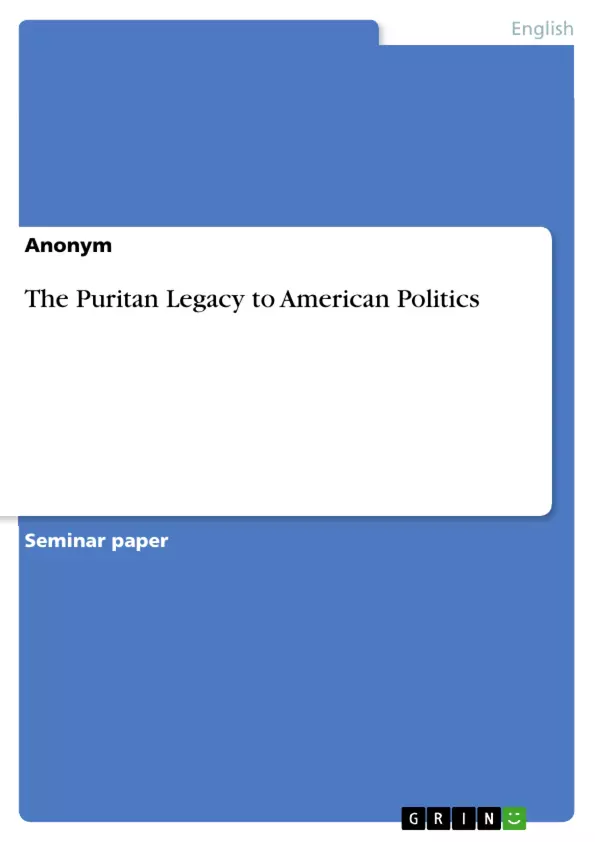Americans express a peculiar fascination with the founding of their country. Both
citizens and scholars often disagree over details of the beginnings but many Americans
define themselves in relation to the founding. History inspires them and provides a patriotic
sense of belonging. It is often debated whether current policies are faithful to the so-called
founding principles, what has stayed the same and what has changed. Though many
countries celebrate their birth, only Americans combine so much cultural myths and political
history.
Alexis de Tocqueville famously said: “I think I can see the whole destiny of America
contained in the first Puritan who landed on those shores”(Tocqueville 1831-32). And
indeed, much of American mainstream culture builds on a Puritan legacy. They claim to
have inherited it by promoting the idea of religious freedom and equal opportunity, by being
a ‘city upon a hill’, a stronghold for democracy, and much more. However, only by retracing
the historical development of Puritanism and its roots, it becomes possible to determine what
sufficiently defines the Puritan legacy and what causes the persistent relevance in American
politics up to this day. As Perry Miller stated, “[w]ithout some understanding of Puritanism,
it may safely be said, there is no understanding of America” (Miller 1950, 4).
In this work I will therefore begin with reviewing the historical background of
Puritan theology and development in North America. Given this as a basis, I intend to trace
back political modes of thought and behavior to Puritan roots. I will answer the question in
how far Puritanism is still alive today and how its legacy to American politics can be
described.
Inhaltsverzeichnis (Table of Contents)
- Introduction
- Puritanism
- Roots and Development of Puritanism
- Puritan Theology
- The Appeal of Puritanism
- Defining Puritanism
- The Puritan Legacy to American Politics
- American Civil Religion
- The Role of Puritan Concepts in Domestic Politics
- The Puritan Legacy to Presidential Politics
- Puritan Elements in Political Speeches
- Puritan Concepts in American Foreign Policy - American Exceptionalism
- Conclusion
Zielsetzung und Themenschwerpunkte (Objectives and Key Themes)
This work aims to examine the lasting influence of Puritanism on American politics. By tracing the historical development of Puritan theology and its roots, the author seeks to understand how this legacy continues to shape American political thought and behavior today.
- The historical development of Puritanism and its roots
- The influence of Puritan concepts on American civil religion
- The role of Puritan concepts in American domestic politics
- The impact of Puritanism on American foreign policy and the concept of American Exceptionalism
- The enduring relevance of Puritanism in contemporary American politics
Zusammenfassung der Kapitel (Chapter Summaries)
- Introduction: The chapter explores the enduring fascination with the founding of the United States and how the Puritan legacy has shaped American culture and politics. It introduces the central question of the work: to what extent does Puritanism continue to influence American politics today?
- Puritanism: This chapter delves into the origins and development of Puritanism in England, tracing its roots to the English Reformation and the rise of Calvinism. It discusses the key tenets of Puritan theology, including the concepts of original sin, predestination, and the importance of individual salvation. The chapter also explores the social and intellectual characteristics of Puritan communities and their role in shaping early American society.
- The Puritan Legacy to American Politics: This chapter examines the enduring influence of Puritanism on American political culture. It explores the concept of American civil religion and how Puritan values have shaped American political discourse and practice. The chapter also analyzes the specific impact of Puritan concepts on both domestic and foreign policy, including the development of American Exceptionalism.
Schlüsselwörter (Keywords)
Puritanism, American politics, American civil religion, American Exceptionalism, original sin, predestination, salvation, religious freedom, democracy, political discourse, foreign policy, historical development, legacy, influence.
Frequently Asked Questions
What is the "Puritan Legacy" in American politics?
The Puritan legacy refers to the enduring influence of 17th-century Puritan theology and values on American political thought, including concepts like religious freedom, exceptionalism, and the "city upon a hill" metaphor.
How did Puritan theology shape American identity?
Puritan concepts such as predestination, original sin, and individual salvation created a moral framework that Americans often use to define their national destiny and sense of belonging.
What is "American Civil Religion"?
It is a non-sectarian faith that incorporates religious symbols and themes into national political life, often drawing heavily from the Puritan tradition to justify political actions and unity.
How does Puritanism influence American foreign policy?
The concept of "American Exceptionalism"—the idea that the U.S. has a unique mission in the world—is rooted in the Puritan belief of being a chosen people or a moral example for other nations.
Is Puritanism still relevant in modern political speeches?
Yes, many U.S. presidents and politicians continue to use Puritan rhetoric and moral framing in their speeches to appeal to traditional values and national purpose.
What did Alexis de Tocqueville say about Puritans?
Tocqueville famously stated that the whole destiny of America was contained in the first Puritan who landed on its shores, highlighting their foundational role in American culture.
- Quote paper
- Anonym (Author), 2005, The Puritan Legacy to American Politics, Munich, GRIN Verlag, https://www.grin.com/document/153853



